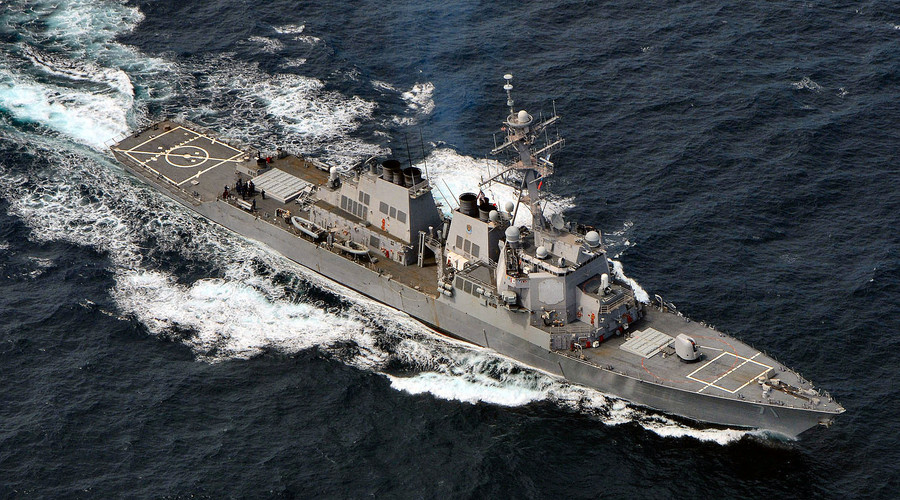Guided missile destroyer USS Ross enters Black Sea to ‘strengthen regional security’
RT.com
The Arleigh Burke destroyer USS Ross is set to join the international exercises in the Back Sea that involve several NATO countries, including the US, Bulgaria, Greece, Lithuania, Italy, Poland, Romania, Turkey and the UK, as well as non-NATO members, such Georgia and Ukraine.
READ MORE: Guided missile destroyer USS Porter enters Black Sea ‘to promote peace’ (VIDEO)
The second stage of the drills called Sea Breeze 2016 started on Monday and will last until July 30. The exercises are the 15th iteration of Sea Breeze, which is “an annual exercise held in the Black Sea designed to enhance interoperability and strengthen regional security,” according to the US Navy.
The first stage lasted from July 11 to July 17, with 25 military vessels, two planes, two helicopters and some 1,700 personnel are taking part in the exercise conducted in the international waters of the Black Sea.
#USSRoss enters the #BlackSea to take part in #SeaBreeze2016. https://t.co/cB6slZdYBv pic.twitter.com/XqFP9ubX8m
— U.S. Naval Forces Europe-Africa/U.S. 6th Fleet (@USNavyEurope) July 22, 2016
Some 2,500 personnel from 13 countries are taking part in this stage of the drills that include, “maritime interdiction operations as a primary means to enhance maritime security. Other warfare areas to be tested include air defense, anti-submarine warfare, damage control, search and rescue, and other tactical maneuvers,” according to the Navy.
My final visit to beautiful Odesa this weekend. Delighted to be there for both #SeaBreeze2016 and #oiff @odessaiff pic.twitter.com/FXPqlrFcu9
— George J. Tsunis (@USAmbassadorGR) July 22, 2016
USS Ross is one of four US destroyers based in Rota, Spain. It is equipped with the Aegis missile defense system that is designed for the fleet’s air defense against massive air raids. Aegis is also used as a part of the US global missile defense system. The vessel is equipped with two blocks of missile launchers and is able to carry as many as 90 missiles, including ‘Standard’ ABM interceptor missiles and Tomahawk missiles.
On Thursday, USS Whidbey Island, an amphibious warship able to carry up to 500 US marines, entered the Black Sea and joined the drills.
The growing activity of the US Navy in the Black Sea raises concerns in Russia. Russian armed forces will draw conclusions from the activities of the US naval vessels in the region, Vladimir Komoedov, the head of the Russian State Duma’s Defense Committee and former commander of the Russian Black Sea Fleet, told journalists.
“The US continues to take an interest in the Black Sea region. The arrival of the US amphibious assault ship sparks concern. It is of no importance under what pretext it takes place. This move provokes only condemnation,” Komoedov said, as quoted by RIA Novosti.
He also stressed that the arrival of the US warships in the Black Sea serves as evidences of the aggressiveness of the US policy. “I am sure that we will draw conclusion from this situation,” Komoedov added.
Following Crimea’s reunification with Russia after a referendum in March 2014, NATO member states in the region have been scaremongering that the Black Sea is turning into a “Russian lake.”
Since the spring of 2014, NATO warships, including missile cruisers from the US and other allied nations, have been patrolling the Black Sea on a rotational basis, never leaving the area unattended.
A possible military beef-up in the Black Sea would see the creation of NATO’s Black Sea Fleet, formed by member-states with direct access to the sea.
READ MORE: Bulgaria sails against tide as NATO mulls stronger presence in Black Sea
NATO’s Black Sea flotilla was initially proposed by Romania in January, and immediately backed by Turkey, another member country, that at the time had tense relations with Moscow. Ukraine, which is not a NATO member, has also expressed its readiness to join the force, even though it only has one combat-worthy warship at the moment. Bulgaria opposed the proposal citing concerns over further militarization.
The final decision on creation of the Black Sea flotilla will be taken by the NATO defense ministers in October.

